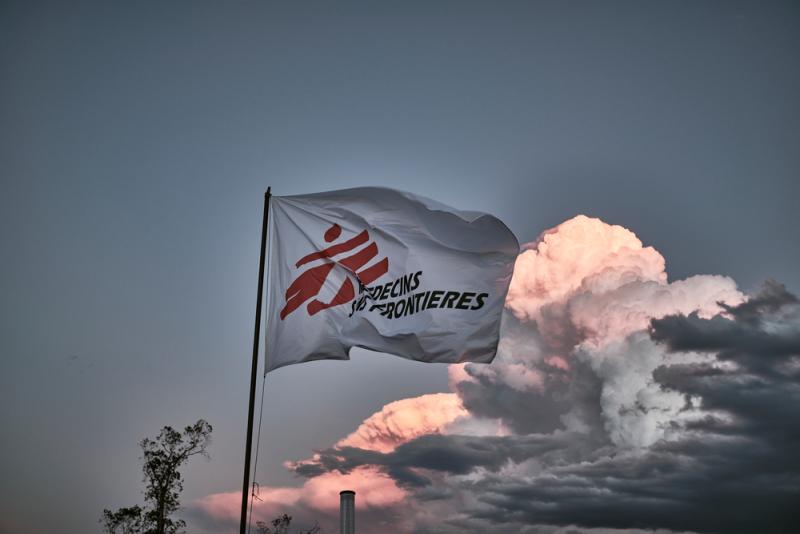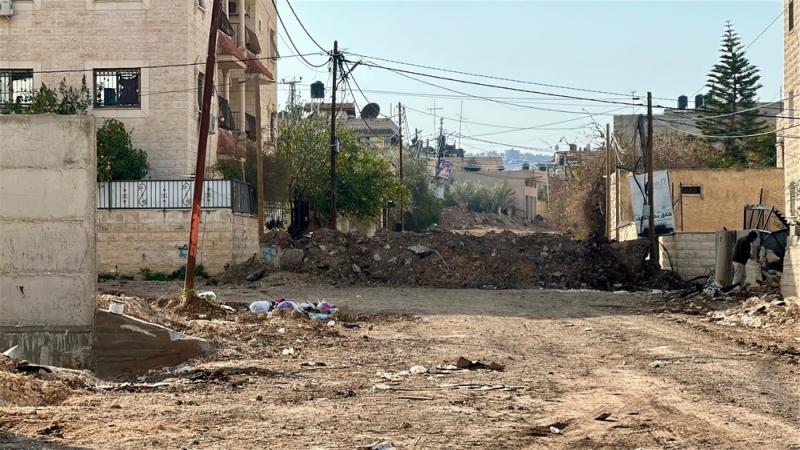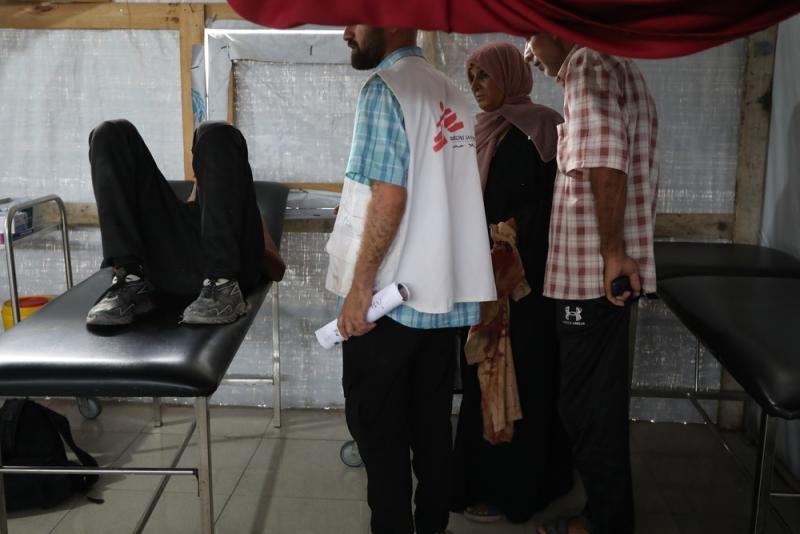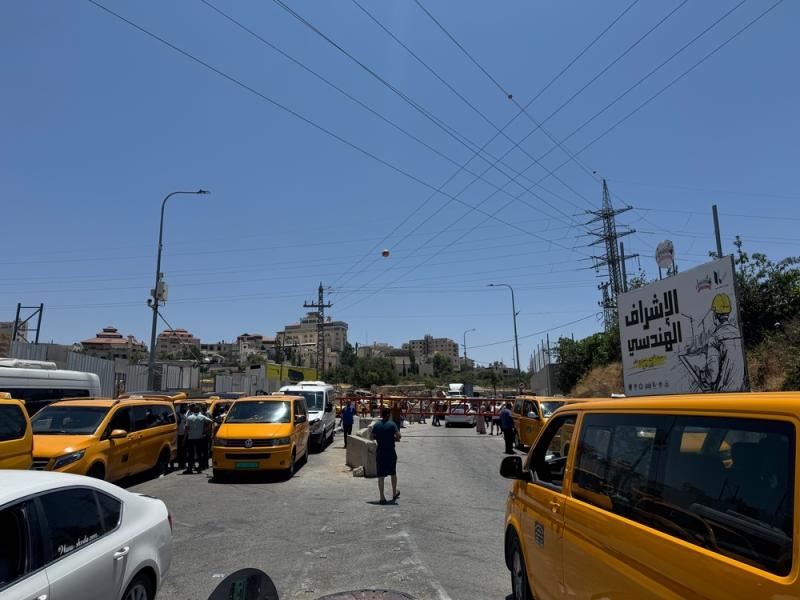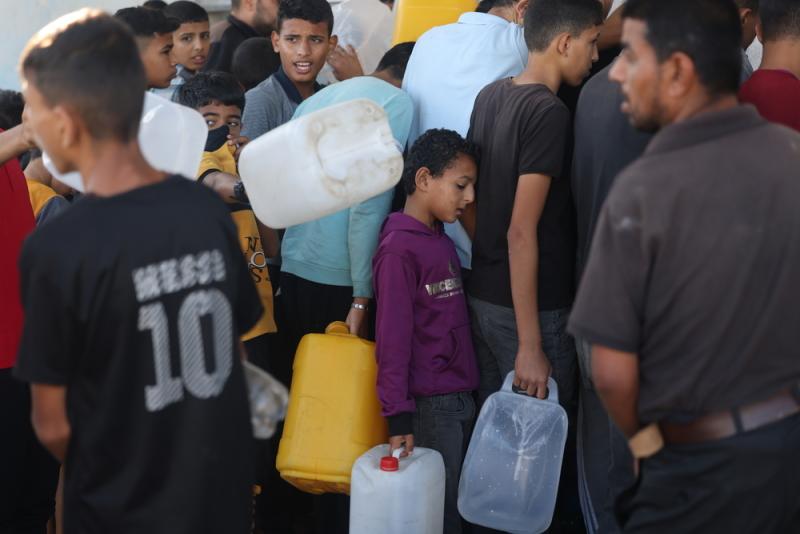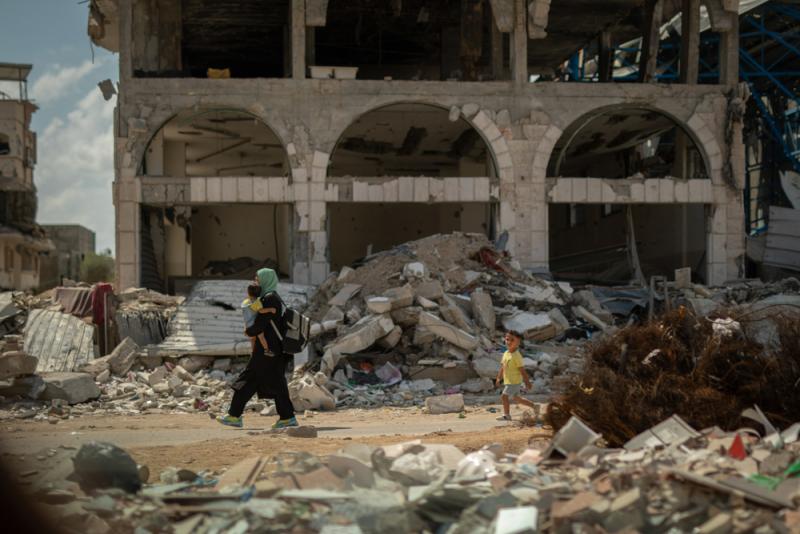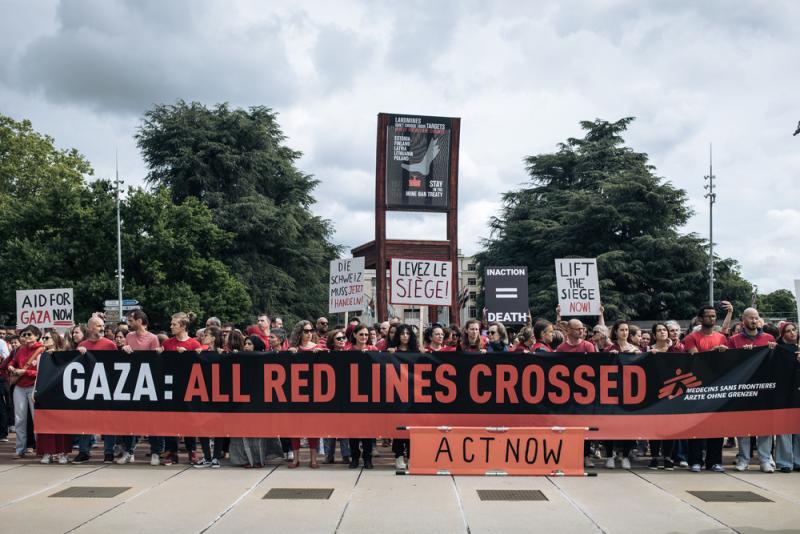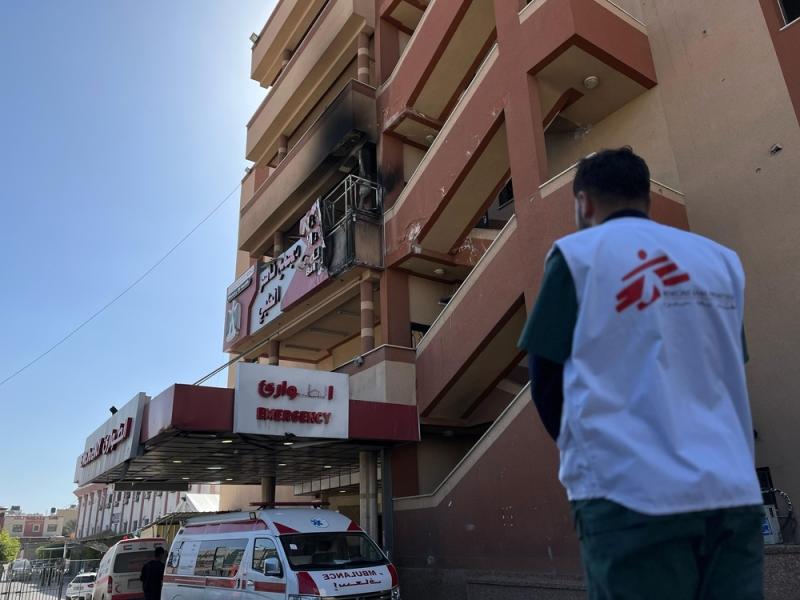The situation in Gaza has reached a critical humanitarian point.
Update
The Israeli-US food distribution scheme in Gaza, launched one month ago, is degrading Palestinians by design, forcing them to choose between starvation or risking their lives for minimal supplies.
Doctors Without Borders calls on the Israeli authorities and their allies to lift the siege on food, fuel, medical, and humanitarian supplies and to revert to the pre-existing principled humanitarian system, coordinated by the UN.
According to Gaza’s Ministry of Health, in just four weeks, over 500 people killed and nearly 4,000 wounded while seeking food.
Will you support our emergency response work?
Help us provide lifesaving medical care during emergencies by making a donation today.
Over 50,000 people have been killed since October 2023, nearly a third of whom are children, according to the Ministry of Health. Since the resumption of hostilities on 18 March, more than 1,500 people have been killed, according to local authorities.
As Israeli forces resumed and expanded their military offensive by air, ground and sea on the Gaza Strip, Palestine, forcibly displacing people and deliberately blocking essential aid, Palestinian lives were once again being systematically destroyed.
The Israeli forces continue to systematically use last-minute displacement orders as a violent tool. Incessant bombing, a near-total blockade of aid, and displacement orders are moving and trapping hundreds of thousands of people into ever-shrinking spaces.
The militarisation of aid in Gaza
Before October 2023, 500 aid trucks were entering Gaza every day, according to the UN. The current authorisation for 100 per day, when the situation is so dire, is woefully inadequate.
The Israeli authorities’ decision to allow a ridiculously inadequate amount of aid into Gaza after months of an air-tight siege signals their intention to avoid the accusation of starving people in Gaza, while in fact keeping them barely surviving.Pascale Coissard, Emergency Coordinator
Israel’s plan to instrumentalise aid is a cynical response to the very humanitarian crisis they created. If they wished, Israel and its allies could lift the blockade today and let humanitarian aid reach all those in Gaza whose survival depends on it.
Attacks on civilians and healthcare must stop now and aid must enter Gaza in sufficient quantities and in a way that allows it to reach those who need it. Israel’s allies must exert all their pressure to make this happen as a matter of extreme urgency. Every day that is lost reinforces their complicity in the annihilation of the people of Gaza.
Along with displacement orders and bombing campaigns that kill civilians, weaponising aid in this manner may constitute crimes against humanity. Only a lasting ceasefire and the immediate opening of Gaza’s borders for humanitarian aid – including food, medical supplies, fuel and equipment – can ease this man-made catastrophe.Christopher Lockyear, Secretary General
Situation in Gaza
The escalation of violence broke out in Gaza and Israel on 7 October. This has led to heavy Israeli bombardment and indiscriminate attacks, leaving thousands of people injured, and many killed. More than 2.2 million people are currently trapped in Gaza and grave humanitarian need.
Over 1.9 million – over 85 per cent – of the entire population in Gaza had to flee their homes according to OCHA, with half of all displaced people crammed in the south in appalling conditions: they live in temporary structures made of a few pieces of wood banged together and covered in plastic sheeting. Many people sleep in the streets or in the open areas. They struggle to find enough water to meet their hygiene needs.
On March 25, the UN Security Council finally stepped up, ordering an immediate ceasefire in Gaza. This resolution was not implemented.
Israeli forces continue to carry out widespread attacks disproportionately impacting civilians. Palestinians in Gaza are suffering every day from an all-out destructive military campaign that blatantly ignores the rules of war.
Without an immediate and sustained ceasefire, and the entrance of meaningful humanitarian assistance, we will continue to see more people die.
On May 24, the ICJ ordered Israel to halt its offensive on Rafah in southern Gaza and to reopen the Rafah crossing. It is another confirmation of how catastrophic the situation is and of the desperate need for humanitarian aid to be scaled up immediately.
Since the beginning of this war, Doctors Without Borders has seen a pattern of attacks against medical facilities and civilian infrastructure. The health system in Gaza is being dismantled just as the needs are exploding, with devastating consequences for Palestinian people. Each medical centre or humanitarian delivery system has been or is being destroyed, to be replaced by less effective, improvised options.
On January 19, 2025, a ceasefire was implemented in Gaza after an agreement was reached between Israel and Hamas. According to the Ministry of Health, during the 467 days of war: more than 48,181 have been killed, including 13,000 children and more than 111,638 people have been injured.
In the early hours of 18 March, Israeli forces attacked multiple areas in the Gaza Strip, after almost two-months of an already fragile ceasefire.
A siege imposed by Israeli authorities in Gaza meant no aid or commercial trucks were allowed to enter. On 9 March they cut the electricity needed to power water desalination plants. This total blockade of aid and electricity deprived people of most basic services, amounting to collective punishment.
The obstruction of humanitarian aid is a direct violation of UN Security Council Resolution 2720, which calls for the unimpeded delivery of humanitarian aid to civilians. The US-Israel proposition to control the distribution of supplies under the guise of humanitarian aid raises grave humanitarian, ethical, security and legal concerns.
On 27 May, the first afternoon of distribution in Rafah, south Gaza, dozens of people were shot and injured as wholly insufficient amounts of basic lifesaving supplies were distributed amid chaos. Dozens of Palestinians were killed and hundreds more injured on 1 June, as they waited for food at the distribution centres. The Israeli-US food distribution scheme in Gaza is degrading Palestinians by design, forcing them to choose between starvation or risking their lives for minimal supplies. Meanwhile, not a single hospital in the Gaza Strip is currently fully functional. As of 17 June, only 17 out of 36 hospitals are partially functional, according to WHO.
- Attack on Doctors Without Borders-supported hospitals
The health system in Gaza is also under attack. Between 7 October and 9 December, 286 healthcare workers were killed in the Gaza Strip, 57 ambulances were hit and damaged.
7 October: Airstrike very close to Indonesian and An-Nasser hospitals. Both were supported by Doctors Without Borders.
10 October: An outpatient department at Doctors Without Borders Gaza clinic was damaged in an Israeli airstrike. The entrance of the dressing room and sedation room caved in, and windows were shattered.
11 October: Airstrike very close to Al-Awda hospital in north Gaza, where Doctors Without Borders has been operating since 2018. The blast caused damage to the hospital, but the hospital continued to function.
13 October: Israeli forces gave just two hours to evacuate Doctors Without Borders-supported Al-Awda hospital. The hospital was not hit however, there was a sustained bombing close to the hospital as medical staff worked to refer patients to other hospitals. The hospital was damaged again in this further bombing.
30 October: Doctors Without Borders-supported Turkish-Palestinian Friendship hospital in Gaza was hit by a projectile, causing serious damage to the third floor of the building. The hospital stopped completely to function when it ran out of fuel on 1 November. It was the only public hospital with an oncology ward in the Gaza Strip.
3 November: An ambulance was directly hit and destroyed outside Al-Shifa hospital, resulting in the death of many.
Since 10 November: Multiple and repeated attacks on various hospitals have been reported and/or witnessed by Doctors Without Borders staff in northern Gaza, including on the biggest medical complex, Al-Shifa hospital.
18 November: Doctors Without Borders evacuation convoy from Al-Shifa hospital was fired on, killing two people in what appeared to be a deliberate attack by Israeli forces on identified Doctors Without Borders cars.
20 November: Doctors Without Borders clinic in Gaza city was damaged by the Israeli forces, which was preceded by deliberate destruction of our cars by Israeli heavy military vehicles.
21 November: A strike hit Al-Awda hospital. In this attack, two of our doctors, Dr. Mahmoud Abu Nujaila and Dr. Ahmad Al Sahar, and another doctor, Dr. Ziad Al-Tatari, were killed.
24 November: A minibus sent from the south of Gaza for another evacuation attempt of Doctors Without Borders staff and their relatives was destroyed by the Israeli forces.
1 December: Just hours after the truce ended, a blast damaged Al-Awda hospital.
5 December: Al-Awda hospital is facing a total siege. They cannot move, and there are snipers surrounding the hospital. In the days following the commencement of this siege, two members of medical staff at the hospital were shot and killed.
11 December: A Doctors Without Borders surgeon was injured inside Al-Awda hospital by a shot fired from outside the facility. Our colleagues report snipers surrounding the hospital, firing on those inside. Al-Awda hospital has been under total siege by Israeli forces since 5 December.
17 December: Israeli forces take control of Al-Awda hospital after a 12-day siege. Males over 16 years old are taken, stripped and interrogated – six Doctors Without Borders staff among them. After the interrogations, most of them are sent back into the hospital and told not to move.
6 January: Al-Aqsa Hospital is evacuated after fighting gets close and evacuation orders put the Doctors Without Borders pharmacy inside exclusion area. A sniper bullet broke through the intensive care unit wall on January 5th.
8 January: Doctors Without Borders shelter in Khan Yunis was struck by a tank shell, killing the 5-year-old daughter of our staff.
22 January: Nasser Hospital in Khan Yunis is surrounded by fighting, bombing, and evacuation orders. Strikes are killing people as close as 150 meters from hospital entrance, staff report.
15 February: A shell struck the orthopedic department; staff members fled the compound, leaving behind several patients. One Doctors Without Borders staff was detained at a checkpoint by Israeli forces, and is still in their custody.
20 February: An Israeli tank fired on a house sheltering Doctors Without Borders colleagues and their families, killing two people and injuring seven people.
2 March: A shell struck a shed next to the main entrance of Al-Emirati hospital in Rafah, killing two people and injuring several others.
13 March: the Israeli military conducted operations in Jenin (West Bank). At the Doctors Without Borders-supported Khalil Suleiman hospital, people standing in the hospital courtyard were fired on. Six people by the emergency room door were wounded, two of whom later died.
27 March: an airstrike hit a greenhouse near Al-Shaboura clinic, a Doctors Without Borders-supported facility in Rafah. Several people were reportedly killed in the attack, despite a United Nations Security Council Resolution requiring a ceasefire being passed on 25 March. No MSF staff or patients were hurt.
31 March: an Israeli airstrike hit the yard of Doctors Without Borders-supported Al-Aqsa hospital compound just outside of the emergency room, where many internally displaced people were sheltering. Many people were killed and injured. After the attack, part of the Doctors Without Borders team had to stop providing care.
1 April: after a 14-day long operation by Israeli forces in and around Al-Shifa hospital, the hospital was left in ruins and out of service. A Doctors Without Borders clinic in the hospital’s vicinity was also badly damaged. Hundreds of people were killed, including medical staff, and mass arrests of medical staff and other people took place in and around the hospital.
21 April: a Doctors Without Borders-trained paramedical volunteer was shot in the leg while on duty during a three-day incursion in Tulkarem and Nur Shams refugee camps in the West Bank. Due to the hostilities, it took him seven hours to reach the hospital.
6 May: a Doctors Without Borders-supported stabilisation point was stormed during a violent raid by Israeli forces in Tulkarem and Nur Shams camps in the West Bank. Volunteer paramedics trained by Doctors Without Borders were harassed and no longer feel safe in providing lifesaving care to patients.
19 May: between 6am to 6.30, Doctors Without Borders teams reported hearing almost one strike per minute in Khan Younis. One of these strikes hit Nasser hospital compound, 100 metres away from the intensive care unit and the inpatient department that are run by Doctors Without Borders. This is the third time in two months that Nasser Hospital compound has been struck, once again depriving people of treatment and care.
Maps of our current response in Gaza and the West Bank
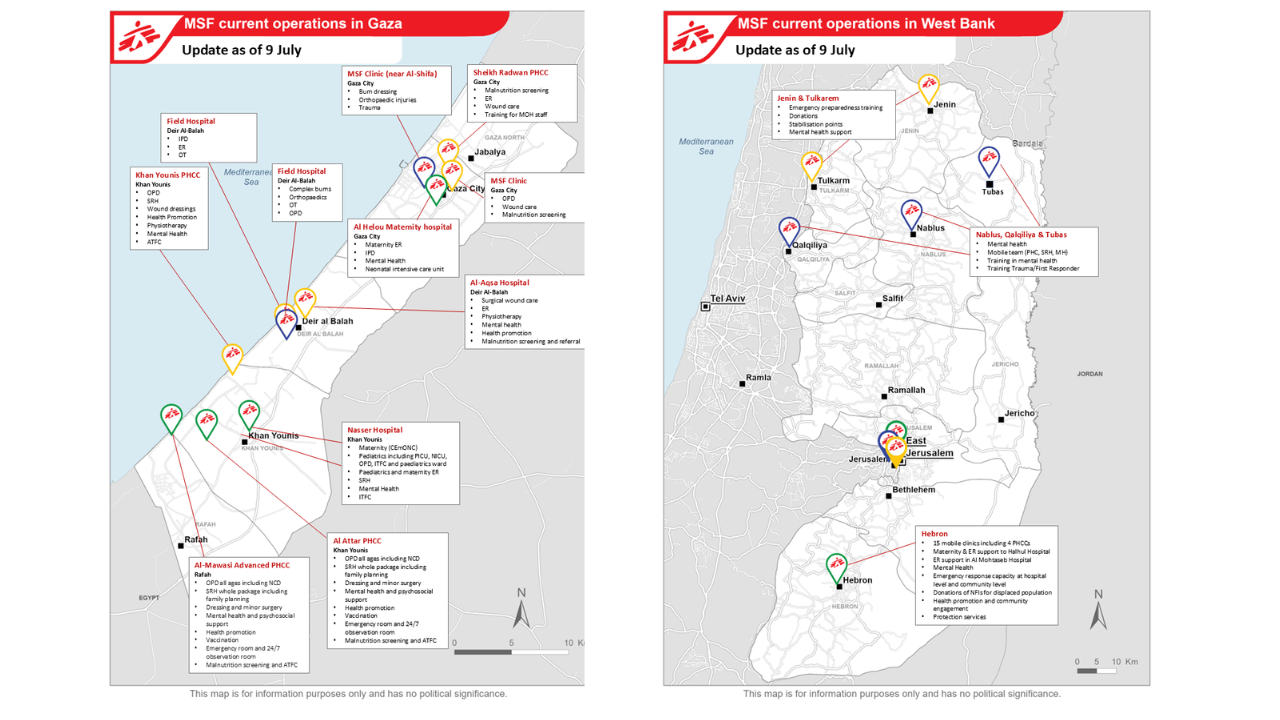
- Outpatient consultations: 1,004,974
- Emergency presentations: 267,981
- People treated for diarrhoea: 63,764
- Surgical interventions: 23,013
- Inpatients admitted: 46,637
- Ante-natal consultations: 58,883
- Deliveries: 13,226
- Individual mental health consultations: 55,859
- Non-communicable disease consultations: 70,501
- North
In January 2025, we started supporting the Ministry of Health (MoH) at Sheikh Radwan Primary Health Care Centre (PHCC) through strategic donations, staff incentives, and supply. We also provide technical supervision and training for staff on malnutrition, emergency care, and wound care. In February 2025, Doctors Without Borders teams launched mobile clinics offering primary health care and water distribution in various areas, including Jabalia Camp. However, these activities were suspended on 18 March 2025 due to the resumption of hostilities, also in May 2025 due to displacement orders. Since 24 June 2025, we have resumed our technical guidance support and strategic donations and staff incentives to the facility.
We have started supporting the MoH at the Al Helou Maternity Hospital since April 2025. Our teams are supporting maternity activities in the emergency room, in-patient department, delivery rooms and operating theatres, and newborn intensive care unit (NICU) and providing mental healthcare and health promotion.
Doctors Without Borders operates two clinics in Gaza City. One of the clinics, originally opened in October and reopened twice, in April and July 2024, is now providing treatment for burns, orthopaedic injuries, and trauma.
In April 2025, after the war resumed in mid-March and mobile clinics closed, we converted our former office into another small clinic in Gaza City serving a limited number of patients daily. Our service includes treatment for non-communicable diseases, general consultations, reproductive care, wound care, physiotherapy, and nutrition support for children under five, pregnant, and breastfeeding women. The Ministry of Health provides vaccinations twice a week. In June 2025, Doctors Without Borders and the MoH at Al Shifa hospital opened a 13-bed short stay unit to ease overcrowding. It admits stable patients needing 2–3 days of continued care before discharge.
- Middle Area
In the Middle Area, we are supporting Al-Aqsa hospital in Deir Al-Balah. In February, we resumed wound and rehabilitation care at the facility, alongside our continued support to the emergency department, particularly during mass casualty incidents. However, due to shifting security dynamics around the hospital, since May, we transitioned to remote support and short, strategic visits, including the deployment of incentivised staff to help maintain essential services despite ongoing challenges.
Meanwhile, after operating for over a year within Al Aqsa hospital, our wound care services were moved to the Ministry of Health’s PHCC in Deir Al Balah. This relocation was necessary in response to the volatile security situation. From this new location, our teams continue to provide essential wound care, while also screening children under five for malnutrition and referring them to nearby services when needed.
In end-August 2024, in response to the destruction of Gaza's health system, Doctors Without Borders teams, in collaboration with the Ministry of Health, have opened a field hospital in Deir Al Balah. The facility includes an Emergency Department, Outpatient and Inpatient services, and an operating theatre, with a capacity of 90 beds.
After relocating from several wards at Nasser Hospital, in June 2025, Doctors Without Borders teams moved some services to a field hospital in Deir Al Balah, where we now operate the burns and orthopaedic wards. The facility has 63 inpatient beds and also hosts our outpatient services, which previously took place at Nasser.
- South
In the South, we are supporting more healthcare facilities. Nasser Hospital is the main surgical centre in the south of the Gaza Strip, located in Khan Younis, and the first largest in the whole Strip as now Al-Shifa is not functioning anymore. After Israeli troops withdrew from Khan Younis, Doctors Without Borders visited the hospital in April to assess the possibility of resuming activities. In mid-May, in collaboration with the Ministry of Health, Doctors Without Borders relaunched operations in Nasser, focusing on orthopaedic surgery and the burn unit. The maternity, NICU and paediatric ward started on May 25. We are now working in a 68-bed in-patient department. We have opened OPD for wound care (burn and trauma cases) providing dressings and physio sessions. We are also running daycare surgery service (3 days/week) for trauma and burn patients requiring small interventions that need anaesthesia but no hospitalisation for more than one day due to a lack of beds in the inpatient department.
Doctors Without Borders supports mother and childcare in Nasser hospital, including 3 paediatric wards, pre- and post-partum wards, paediatric intensive care unit (PICU) & newborn intensive care unit (NICU), emergency rooms, and mental healthcare. Mid-June, we also opened an inpatient therapeutic feeding centre (ITFC) for malnourished children. Nasser’s maternity is one of the few functional maternities in the South of Gaza.
Since end of January 2024, at Al-Mawasi Advanced PHCC in Rafah, Doctors Without Borders staff provide outpatient services such as general and paediatric consultations, vaccinations, reproductive healthcare, wound care, minor surgery, mental health support, and health promotion. The PHCC features a 24/7 emergency room for stabilizing and referring severe cases, as well as malnutrition screening and an ambulatory feeding treatment centre for children and pregnant or lactating women.
Khan Younis PHCC opened on May 6. Doctors Without Borders provides outpatient consultations, vaccination, mental health, ambulatory therapeutic feeding centre (ATFC), maternal and reproductive healthcare, wound care and physiotherapy, and health promotion. Given the massive influx of population from Rafah into an already packed humanitarian zone, and the lack of health facilities to cover trauma needs, we have recently expanded to include a lightweight emergency service focused on stabilising and referring more complex cases while managing simpler cases in November 2024.
In mid-June 2024, Al Attar PHCC, located between Al Mawasi and Khan Younis, was opened to address the needs of the local population who have set up tents in the area. We offer different services, such as general medicine, paediatric consultations, emergency healthcare and wound care, antenatal and postnatal care, mental healthcare, health promotion, and malnutrition screening and ambulatory therapeutic feeding centre (ATFC) for children, infants and pregnant women. There is also a 24-hour emergency service to stabilize and refer patients.
How Doctors Without Borders is responding
As of 21 June 2025
Doctors Without Borders remains committed to providing medical care in Gaza. Our teams currently work in two hospitals, two field hospitals, and eight healthcare facilities.
Our teams are offering surgical support, wound care, physiotherapy, maternity and paediatric care, primary health care, vaccination, and mental health services, but sieges and evacuation orders on various hospitals are pushing our activities towards ever-smaller territory and limited response. Doctors Without Borders teams are also providing water distribution.
Doctors Without Borders activities in figures:
Water and sanitation
The lack of water, hygiene, and sanitation in Gaza risks a devastating disease outbreak, endangering an already weakened population. In January 2025, Doctors Without Borders distributed more than 1,400,000 litre of water per day through water trucks and desalinisation process in more than 64 water points in Al Mawasi, Khan Younis, Rafah, and Deir El Balah. We are continuously working to increase this quantity, as drinkable water is a scarce source.
Since February 2024, through partnership with PARC - Agriculture Development Association, Doctors Without Borders is implementing water and sanitation activities in camp shelters in Deir Al Balah and Khan Younis. This includes building latrines for more than 30,000 people located in 6 camps, hygiene kits distribution for 2,400 families, and equipping a camp hosting 70 families (400 people) of people living with disabilities with the needed sanitary facilities (accessible latrines and showers).
Suppy and logistics
As of end of June 2024, Doctors Without Borders has brought seven cargos, a total of 73 trucks, into Gaza through United Nations. Rafah crossing point, formerly the main functional entry point for humanitarian actors, has been closed since early May. This has led to massive queues of trucks and perilous delays in the delivery of humanitarian assistance across Gaza.
On a monthly basis, we are able to deliver medical supplies, including medicines, surgical kits, logistical items and humanitarian aid. It consists of one chartered plane and a small amount of locally purchased items. However, bringing supplies into Gaza has been extremely difficult due to administrative barriers, movement restrictions and lack of crossing options.
- What is happening in the West Bank?
Since October 2023, violence in the occupied West Bank has escalated, with increased attacks on Palestinians by Israeli settlers and forces. The Jenin refugee camp, long targeted by Israeli incursions, has faced intensified military operations, including airstrikes. Doctors Without Borders provides emergency care, primary health care via mobile clinics, and mental health support in Hebron, Nablus, and Jenin.
- How is Doctors Without Borders responding in the West Bank?
In the West Bank, we are maintaining activities focused on emergency care, and mental health care in Hebron, Nablus, Tulkarem and Jenin.
Nablus: Doctors Without Borders continues to provide psychological and psychiatric care, as well as sexual and reproductive health services in Nablus, Qalqiliya, and Tubas despite intensified movement restrictions. In collaboration with local organisation, we launched the third psychologist intern training program, offering 770 hours of theoretical and practical training.
Doctors Without Borders is also training Palestine Red Crescent Society volunteers as first responders and has equipped six stabilization points to improve emergency care access. Additionally, Doctors Without Borders is training doctors and nurses in three hospitals to enhance trauma response. And since July, a mobile team has been delivering primary health care in six locations to support existing PHCCs amid staffing, access, and medication shortages. In March 2025, our teams provided 100 hygiene kits to the Al Far’a camp through UNWRA.
Hebron: Doctors Without Borders operates 15 mobile clinics and supports six Primary Health Care centers, providing essential health services, including general health care, non-communicable disease management, sexual and reproductive health, and mental health care. In hospitals, Doctors Without Borders is expanding the maternity ward in Halhul Hospital and strengthening emergency response capacity in four hospitals—Dura, Yata, Halhul, and Mohtaseb—through training and medical supply donations. At the community level, Doctors Without Borders enhances emergency preparedness by providing first aid training and supplies in six locations: Beit Ummar, Al Fawwar camp, Al Arroub camp, Aida camp, Azza camp, and Dheisheh camp.
Mental health support and social work case management extend to communities affected by settler attacks in Hebron, Dura, and remote villages in Masafer Yatta, alongside the establishment of safe/community spaces in Umm Qussa, Al Majaz, Umm Al Kheir, and Hebron city. Additionally, Doctors Without Borders has intensified health promotion efforts and humanitarian assistance, including distributing hygiene kits, food parcels, and relief items while also installing portable toilets and water pipes to support displaced populations and those affected by violence and forced displacement.
Jenin and Tulkarem: In Tulkarem and Jenin, our teams are providing medical and humanitarian support to displaced people and host communities. This includes running daily mobile clinics in over 40 locations, supporting shelters and MoH clinics, and offering care for chronic and acute conditions, mental health services.
Since June 2025, we have expanded mental health efforts to deliver psychological first aid in response to increased violence in surrounding villages.
Our teams are also delivering essential supplies: water (over 2.5 million litres), fuel (10,000 litres), food parcels, hygiene kits, bedding, diapers, and clothing. In collaboration with partners, we support vulnerable families through vouchers that preserve dignity and allow choice. The response also includes infrastructure support like donating a generator to an UNRWA clinic to maintain vaccine storage.
Scroll through the conflict timeline
Support our emergency response work
Our medical teams are on the ground treating patients. You can help them provide lifesaving medical care by making a donation today.
-4f08.jpg?h=5d81450a&itok=xuobcox5)
